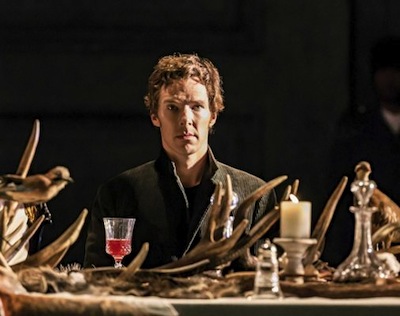
Was the experience worth traveling 5000 miles and 400 years to savor? In a word, yes. In another word, unforgettable.
Cutting to the chase, the world’s most famous (and highly groupied) actor sinks his panther teeth into the plight of Denmark’s prince and unleashes gossamer revelations, nuanced depths, and an uncanny physical ability to translate psychological trickery into gymnastic grace.
Buffed to a chiseled gloss, Cumberbatch is sexy, savvy, and endlessly watchable—speeding, dancing, and stunning his way through the murky bits of dialogue and plot business, while slowing down and taking all the time in the world to explore each one of the celebrated speeches. For example, when he comes down smartly on the “is” of, “that is the question,” the entire soliloquy pivots and becomes an intimate aside to us, the listener. He is considering the tantalizing prospect of suicide, as well as the possible negative entailments of ending his life, and letting us consider each step of the inner argument along with him. This Hamlet confides that he knows that we know he’s only feigning madness in order to entrap his opportunistic uncle Claudius (played with oleoginous charm and lethal intelligence by renowned Irish actor Ciaran Hinds, of Rome fame.)
Those who witnessed his astonishing physical abilities in the theatrical Frankenstein last season will already be convinced that Cumberbatch is an actor gifted with moves that Barishnikov might envy. And he uses his body as another linguistic vehicle, powering us, seducing us, and convincing us to follow him through all of Shakespeare’s tissue of motives, however deeply buried in Freudian terrain. Which brings me to the weaknesses of this production.
The supporting females, Ophelia (played by Sian Brooke with almost laughable robotic voice and body work) and Gertrude (here played by Anastasia Hille as a meek, submissive wife to her villainous husband) fail to give their Hamlet much dramatic pushback. Horatio (Leo Bill) is cast as a whining nerd, and Laertes (Kobna Holdbrook-Smith) as a shouting histrionic with anger issues. The fault lies more with the director (more about Lyndsey Turner next week) than with the obviously adroit actors.
But the magnificent and haunting set created by wunderkind designer Es Devlin gives its star actor much support. The first two hours are played upon a magnificent drawing room, ignited by huge, heavy chandeliers, a stately staircase and layers of space going deep, way back deep into a central corridor. The second part of the play finds this same faded northern royal chambers but now partially filled with rubble, the debris of war—both literal and psychological—that creates an eerie dystopic twilight zone upon which our players strut and fret, climb and claw. It is magnificent—the exact metaphor for Hamlet’s performative, and increasingly real psychic distress.
Cumberbatch as Hamlet is also, believe it or not, great fun. Highlighting the thread of playful humor cunningly inserted by Shakespeare throughout his great tragedy, Cumberbatch’s pranks, sight gags, witty movements, and sheer cleverness power the play. Three hours fly by.
Wagner it’s not.

